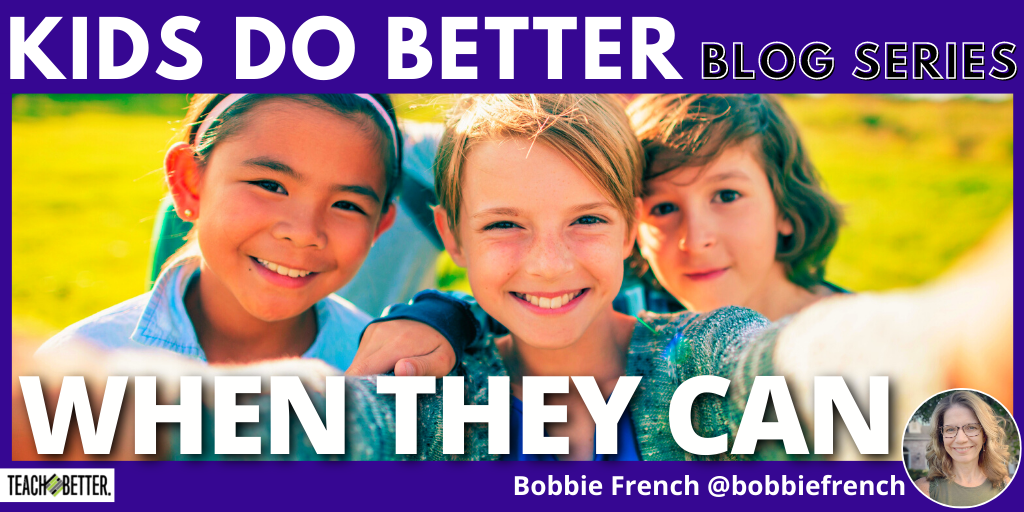TL;DR:
- Welcome to a new blog series to discuss which practices support students best.
- Let’s look at the social and emotional skills of our students.
- Kids do better when they can. Let’s explicitly teach them the skills they need to grow.
- Be consistent with expectations.
- Ask for clarification before correcting a student.
I’m excited to begin this new journey with you and to share best practices to support our students. This is even more important in our practice as educators as we continue to navigate what our post-pandemic schools should look like. I’m optimistic about all that the new school year will bring.
Who Are Your Students?
Students are complex individuals. They all come to school with different genetics, backgrounds, and experiences. This contributes to the variety of skills each of our students has developed. These skills include academic, social, and emotional skills.
As teachers, we do a great job identifying students’ skills that are underdeveloped academically. We look at reading and math skills, find the skills that are lacking, and then develop a plan to improve those skills.
Why don’t we use this same plan to support students in developing underdeveloped social or emotional skills?
As educators, do we stop and think about what skills our students are bringing to the classroom? Why do they do what they do? Do we really think that our students plan ahead to annoy or manipulate us?
Kids Do Better When They Can
We need to remember that Kids Do Better When They Can. And they can if they have the skills. It is our job as educators to teach them those skills. We are in the business of teaching and that goes beyond academics.
Schools have become more and more responsible for teaching kids skills that used to be learned outside of school. Kids used to develop social skills through play and learning what their playmates would tolerate. Imagine a group of preschool students playing blocks only to have their friend knock over their tall tower. There are tears and probably a few slaps as that child lets the friend know they did not like having the tower knocked over. Adults did not jump in to intervene and allowed the kids to work it out and learn from each other.
Adults do a lot more supervising play and intervening when they see something that could be considered not nice or too physical. We want to protect our children from anything uncomfortable but in doing so we are taking away the opportunity for them to learn incidentally through play and experiences.
When students are not meeting your expectation, talk to them. Ask them why they think they are having trouble with the task. Collaborate with them to find out what may be interfering. Click To Tweet
Teach, Model, Practice
Now, think about at school where we enforce lots of rules and expectations for our students. Do we ever teach the rules or expectations? Do we teach our students the expectations or how to do what we want them to do?
Some of you probably use Responsive Classroom or PBIS to teach lessons around your school’s values.
We cannot hold students accountable for skills we have not taught them. I’m a big fan of Responsive Classroom. I believe in the teach, model, practice philosophy.
If you want students to get their materials out and prepare for the day in a specific way, you need to teach them to do it. You cannot just expect that they all know how to do it or how to do it your way. Telling students your expectation will be enough for most of your students. But what about those students that can’t? Those students that you get frustrated with? Those students you think are deliberately choosing to do something different? This is when you need to remember that Kids Do Better When They Can.
Have you given them the skills they need to complete the task or meet the expectation? This is where the philosophy of teach, model, practice comes in. Teach students your expectations. Then model it. Show them what it looks like. You can even ask a student (or a few) to model it. Have the other students watch the model students. Ask them what they notice. Point out how the students completed the task. Then ask a few more students to model the task. Once you think students have an understanding of what you expect, have them practice. Remember that there may be times you need to reteach a skill, especially after school breaks or when students are no longer meeting the expectation.
Consistency Is Key
Now that you have taught students how to do what you want them to do, you need to be consistent with your expectation. Students will rise up to your expectations—if they are clear and consistent. If you expect students to line up in a certain way each time and you praise them for it or have them sit back down and practice when they don’t get it right, they will know and follow your expectation.
If you allow some students to not follow your expectation, the students who were following it will wonder why they need to if other students do not.
When this happens, we often resort to nagging. You know what I mean. We nag or harp on the students that are not following our expectations. We get frustrated and show our annoyance. This is the time to take a breath and remember that Kids Do Better When They Can. Why are they not doing better? It’s time to go back to your teach, model, and practice philosophy.
Have you taught these skills well enough for all students? What is getting in the way of the students not meeting the expectation? Are there underdeveloped skills? Use the answers to these questions to develop a plan to teach, model, and practice the skill. You may need to only do this with a few of the students who need more instruction (just like we do for students who didn’t learn the math skill we taught the first time).
[scroll down to keep reading]
Ask Them
We are going to talk about this in a future blog post because I think it is so important. When students are not meeting your expectation, talk to them. Ask them why they think they are having trouble with the task. Collaborate with them to find out what may be interfering. Students see things from a different perspective than adults. We need to remember that all students come to school with different genetics, backgrounds, and experiences.
Students are an invaluable resource when it comes to helping them identify their underdeveloped skills. We often try to solve these problems on our own and guess at what the issue may be. It’s much easier to ask your student why they are struggling to line up as the class had practiced. You may be surprised at what they tell you.
As you get ready for the new school year, think about all of the expectations you have for students in your classroom. Develop a plan to teach, model, and practice those skills. I want you all to have a fantastic school year and remember that Kids Do Better When They Can.
About Bobbie French
Bobbie French is an educational leader, presenter and writer from Massachusetts.
Bobbie has been an educator for over 24 years. She has been an elementary guidance counselor, classroom teacher, special education coordinator, Title I Director, Preschool Director and Administrator.
Bobbie is passionate about focusing on the whole child and creating an environment where all students have a sense of belonging. She appreciates and recognizes the hard work of teachers, and is committed to supporting others to be their best for kids every day. Her passion and enthusiasm for creating a positive and engaging school culture is contagious.
Bobbie is also an avid photographer and loves to tell her school’s story.





